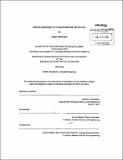Critical assessment of thorium reactor technology
Author(s)
Drenkhahn, Robert (Robert A.)
DownloadFull printable version (1.779Mb)
Other Contributors
Massachusetts Institute of Technology. Dept. of Nuclear Science and Engineering.
Advisor
Dennis Whyte.
Terms of use
Metadata
Show full item recordAbstract
Thorium-based fuels for nuclear reactors are being considered for use with current and future designs in both large and small-scale energy production. Thorium-232 is as abundant on Earth as lead, far more common than all isotopes of uranium, leading to its greatly reduced cost. Thorium itself offers a significantly greater neutron absorption cross-section than uranium at thermal energies, resulting in greater efficiency and smaller geometries. Certain thorium-based fuels can also significantly reduce proliferation by denaturing the thorium fuel cycle product U-233 (which is cause for proliferation concern) with U-236 and U-238. Several countries, including the USA, China, and India, are developing new conceptual designs which focus on the advantages offered by thorium. Thorium reactor technology today, as well as its practicality in the near-future, was surveyed to determine its potential for a major role in the nuclear power industry. Factors considered were economics, efficiency, waste, and proliferation. It is recommended that thorium-based fuels be further integrated in future reactor designs to take advantage of its numerous benefits in these areas.
Description
Thesis (S.B.)--Massachusetts Institute of Technology, Dept. of Nuclear Science and Engineering, 2012. "June 2012." Cataloged from PDF version of thesis. Includes bibliographical references (p. 31-32).
Date issued
2012Department
Massachusetts Institute of Technology. Department of Nuclear Science and EngineeringPublisher
Massachusetts Institute of Technology
Keywords
Nuclear Science and Engineering.